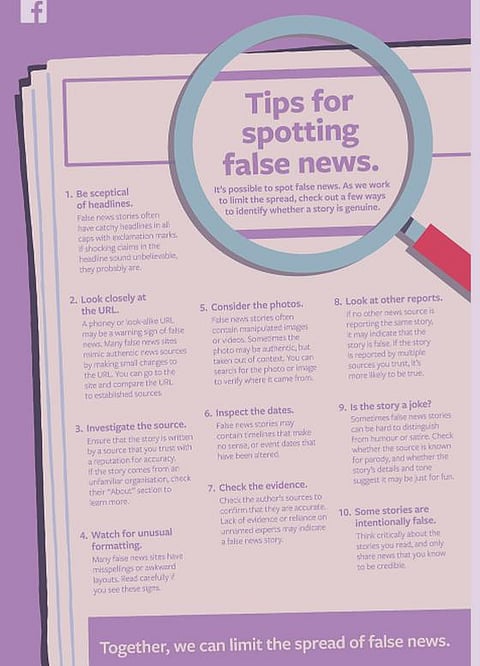After facing the problem of a barrage of fake news on its platform, Facebook has sent out full-page advertisements in morning dailies in India to help identify news as false.
Rising Fake News Force Facebook To Put Out Full-Page Ads In Newspapers Educating Readers
The ad then lists ten headers as ‘tips’ for the average reader to spot falsification.
Full page advertisements appeared in The Telegraph, The Indian Express and The Deccan Herald this morning. Titled ‘Tips for spotting false news’, the advertisement, with Facebook’s logo in the top-left corner says that as they ‘work to limit the spread’ of such articles, it is for the user to stay informed on how to spot if the news is false.
The ad then lists the ten following headers as ‘tips’ for the average reader to spot falsification.
- Be skeptical of headlines.
- Look closely at the URL.
- Investigate the source.
- Watch for unusual formatting.
- Consider the photos.
- Inspect the dates.
- Check the evidence.
- Look at other reports.
- Is this story a joke?
- Some stories are intentionally false.

(Screengrab from The Telegraph)
Why Facebook is asking you to sleuth up is due to its users being inundated with information from sources that are unverifiable and others, visibly fake. Less than a month ago, Facebook announced in a press release that it was stopping advertisements from pages that ‘repeatedly share false news’.
“We’ve found instances of Pages using Facebook ads to build their audiences in order to distribute false news more broadly. Now, if a Page repeatedly shares stories that have been marked as false by third-party fact-checkers, they will no longer be able to buy ads on Facebook.”
The company had said that it if third-party fact-checked and found the articles on a website to be false, it would cut advertisements from those sites.
The problem is not just in India, with websites like Hindutva.info, LogicalBharat.com and DainikBharat.org but also with the Russians, who reportedly flooded Facebook with advertisements and may have spun the Presidential Elections which Donald Trump won.
This report by The Daily Beast elaborated on how the company would not even tell its users who had been affected by Russian propaganda during the elections if they had been.
As this is being written, Facebook is facing flak for revelations by Pro-Republica that the company’s buying system for advertisers allowed them to target users interested in anti-Semitic items.
But for most Indians, it is not Facebook but Whatsapp that is the main source of fake news because phone is their first point of exposure to the internet. The information explosion has flooded their handheld device with so much news that they don’t care to sift fake from genuine news, and swallow everything that comes their way.
Most of the internet users come across as credulous when they receive a forward on Whatsapp. They lower their guard and accept it as truth when an article is forwarded by their friends or family members.
Earlier this year, in Jharkhand seven people were beaten to death mistaking them for child traffickers. They attackers were warned by a Whatsapp message to be careful of strangers who could be child lifters.
WhatsApp had recently said it was exploring ways to check the spread of fake news through its platform.
WhatsApp software engineer Alan Kao termed the situation as "complex" because of the end-to-end encryption of messages on the platform that does not allow anyone -- except the sender and the receiver -- to read the messages.
"We definitely do not want to see fake news on our platform and it's a complex problem in determining what is fake and what isn't. Because of the encryption, we can't read the contents of the messages," Kao was quoted saying.
He added that the Facebook-owned company is looking at different ways in which they can tweak the product to "try and minimise" fake news.
There have been a number of instances, including rumours of the new currency notes featuring a GPS chip and videos related to Muzaffarnagar riots that were circulated and shared virally on WhatsApp as many took them to be true.
With over 200 million users, India is the largest market for WhatsApp that has about 1.3 billion users globally.
Kao said WhatsApp is taking a number of steps, including educating users to explain that they should check the authenticity of content before sharing it on the platform.
Last month, Electronics and IT Minister Ravi Shankar Prasad had said instances of "objectionable videos" being shared through WhatsApp have been noticed.
Since WhatsApp did not have content of the messages available to them, their ability to take action was limited, he had said.
WhatsApp does provide a feature to report objectionable content. A user can take screenshots and share it with appropriate law enforcement authorities, Prasad had said.
With Agency Inputs